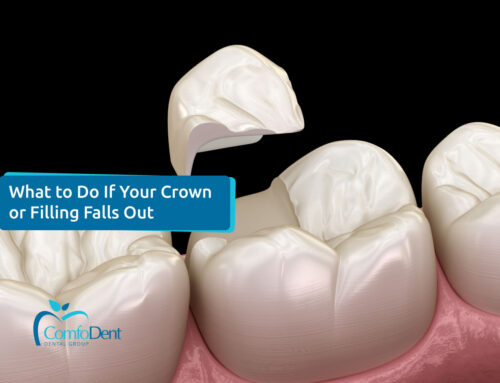At Comfodent Dental Group, we know that a healthy smile is about more than just teeth—it’s about total well-being. Recent research shows that oral health and mental health are closely connected. In fact, problems in the mouth can impact how you feel emotionally, just as mental health struggles can lead to serious dental issues.
Understanding this connection can help you take better care of both your mind and your smile. Let’s explore how oral health affects mental health—and what you can do to protect both.
The Two-Way Relationship Between Mouth and Mind
Our dental health influences how we feel about ourselves and how we connect with others. A confident smile can lift our mood and help us feel more comfortable in social settings. But dental pain, tooth loss, or poor oral hygiene can have the opposite effect—damaging our confidence, increasing stress, and contributing to emotional struggles.
At the same time, people dealing with anxiety, depression, or chronic stress may find it hard to stay on top of brushing, flossing, or visiting the dentist. This can create a cycle where mental health issues and oral health problems reinforce each other.
How Oral Health Affects Mental Health
1. Confidence and Self-Esteem
When you’re unhappy with your teeth—whether it’s because of missing teeth, gum disease, or staining—it can affect how you feel about yourself. People may smile less, avoid conversations, or even stay away from social events. Over time, this loss of confidence can contribute to feelings of isolation, sadness, and anxiety.
2. Dental Pain and Emotional Stress
Toothaches, jaw pain, and gum infections can cause persistent discomfort. This chronic pain wears people down and may lead to fatigue, sleep problems, irritability, and emotional burnout. When pain affects daily activities or disrupts rest, it can increase the risk of anxiety and depression.
3. Gum Disease and Inflammation
Periodontal disease causes inflammation, and studies have found links between body-wide inflammation and mental health disorders, including depression. Bacteria from the mouth can enter the bloodstream and affect other systems—including the brain—potentially increasing the risk of mood disorders or cognitive decline.
4. Medication Side Effects
Medications for mental health conditions such as antidepressants or antipsychotics often cause dry mouth. A lack of saliva makes it harder to wash away food and bacteria, which increases the risk of cavities and gum infections. This adds new dental concerns that can worsen emotional well-being.
5. Eating Disorders and Oral Health
Conditions like bulimia or anorexia often harm the teeth and gums. Repeated vomiting wears away enamel, and nutritional deficiencies weaken the body’s ability to maintain oral health. These visible effects can further impact self-image and mental recovery.
How Mental Health Affects Oral Health
Mental health conditions can lead to behaviors that negatively affect dental care:
-
Depression may result in neglecting brushing and flossing routines or avoiding the dentist.
-
Anxiety or dental phobia can stop people from getting necessary treatments, even when they’re in pain.
-
Stress may lead to habits like grinding teeth (bruxism), biting nails, or clenching the jaw—all of which can damage oral structures.

How Comfodent Dental Group Can Help
We understand how overwhelming it can feel to care for your oral health when you’re already dealing with stress, anxiety, or low mood. That’s why we’ve created a space where every patient feels supported and respected—no matter where they are in their journey.
Compassionate, Judgment-Free Care
Whether it’s been six months or six years since your last appointment, you’ll never be judged at Comfodent Dental Group. We’re here to help you regain your health with patience and care.
Sedation Dentistry to Ease Anxiety
If dental visits make you nervous, we offer both oral sedation and IV sedation to help you feel calm and relaxed. This can be especially helpful for patients who experience anxiety, PTSD, or sensory sensitivity.
Restorative and Cosmetic Dentistry for Confidence
Services like dental crowns, restorations, teeth whitening, and gum treatments are available to rebuild a healthy, confident smile. Feeling good about your appearance can have a lasting impact on your emotional wellness.
Routine Care to Stay on Track
Regular checkups and cleanings not only prevent serious dental problems—they also give you a sense of control and progress, which can boost your overall mood and self-esteem.
Q&A: Mental and Oral Health
Q1: Can poor dental health lead to depression?
A: While it may not directly cause depression, issues like pain, bad breath, or missing teeth can affect confidence and lead to social withdrawal and low mood.
Q2: Is there a link between gum disease and mental illness?
A: Yes. Gum disease is an inflammatory condition, and inflammation has been linked to depression and other mental health concerns.
Q3: What if I feel too anxious to go to the dentist?
A: You’re not alone. Many patients feel this way. That’s why we offer sedation dentistry and a calming environment to make your visit stress-free.
Q4: Can my medication cause dental problems?
A: Some medications reduce saliva flow, leading to dry mouth. We can help with preventive care and recommend products that keep your mouth healthier.
Q5: How can I start fresh with my dental care?
A: Call us for a no-pressure consultation. We’ll work with you to build a treatment plan that fits your needs and comfort level.
Conclusion: We Care for Your Smile—and Your Well-Being
Your mouth and mind are more connected than you may realize. Dental health can support emotional wellness, and feeling good mentally can help you stay committed to oral care. At Comfodent Dental Group, we’re proud to support our patients in both.
Whether you need gentle cleanings, restorative treatments, or help overcoming dental anxiety, we’re here to care for your smile—and your peace of mind.
Schedule your visit today. We’re ready when you are.






